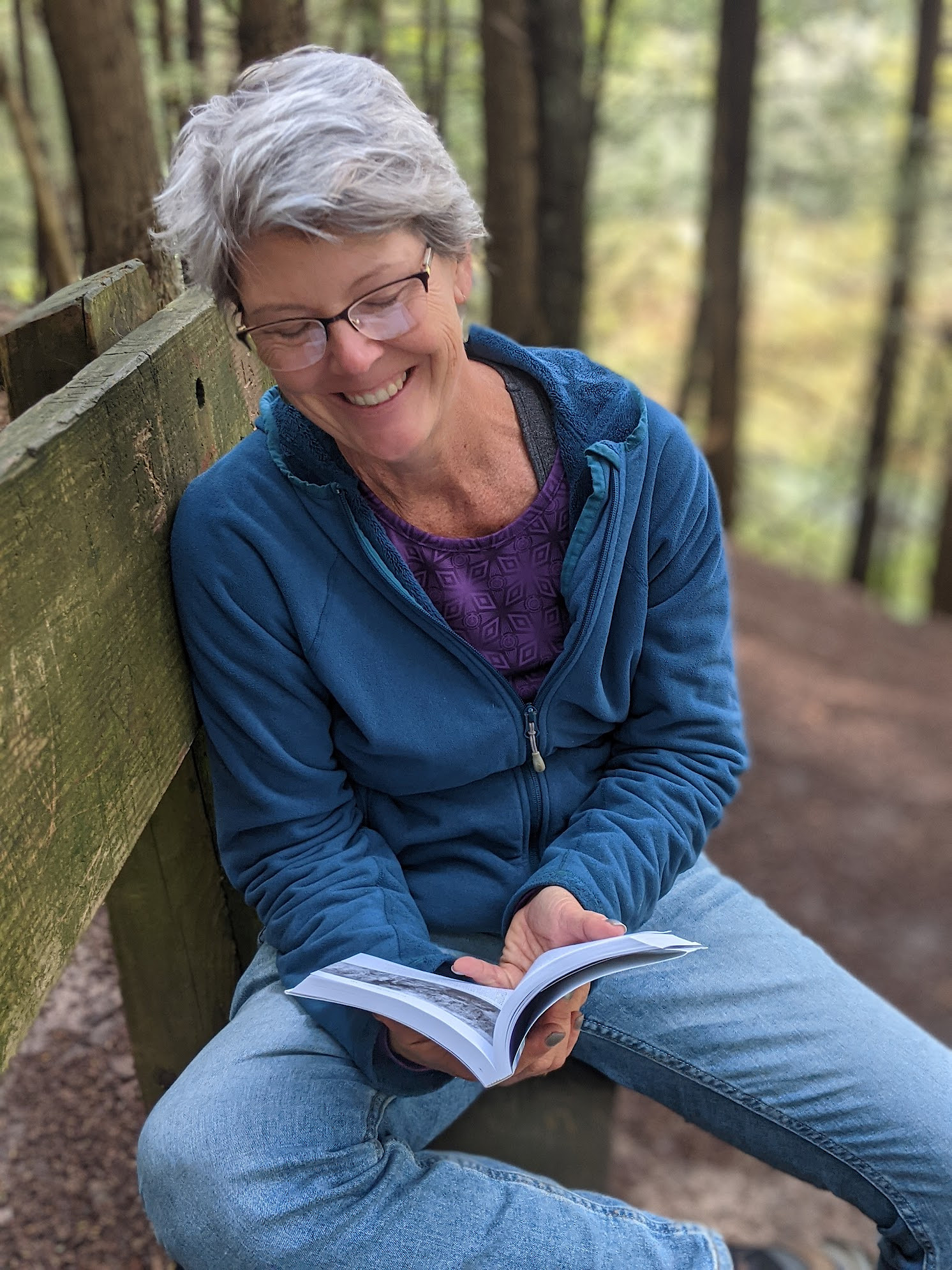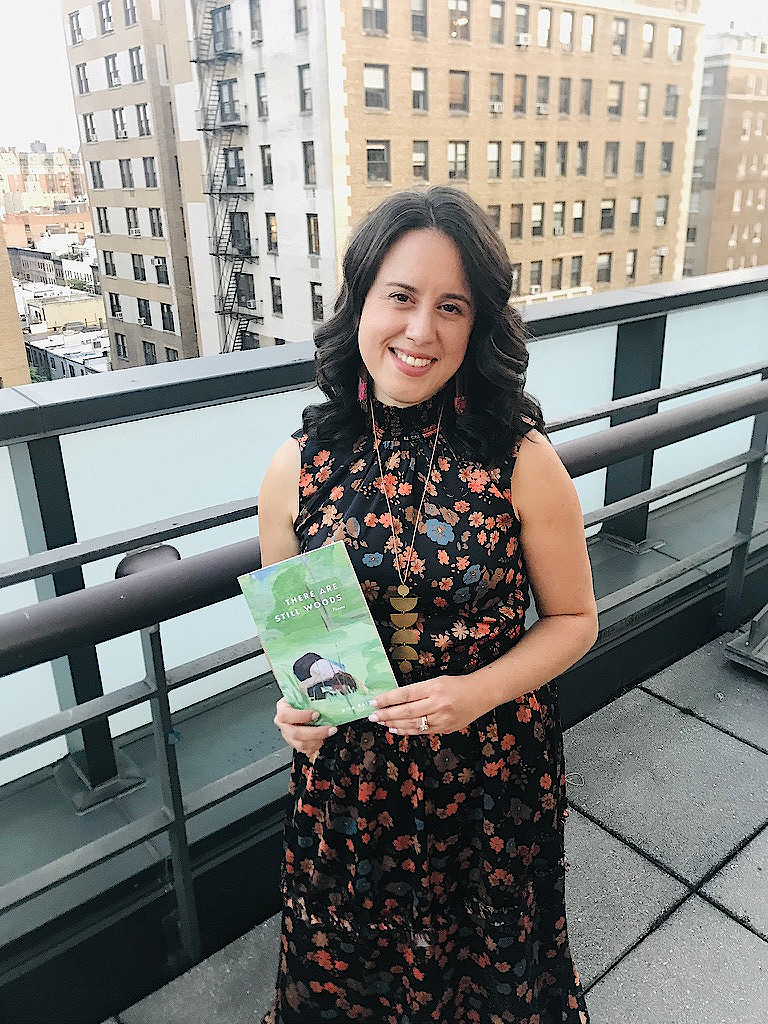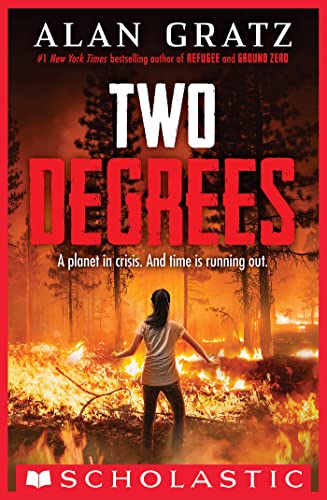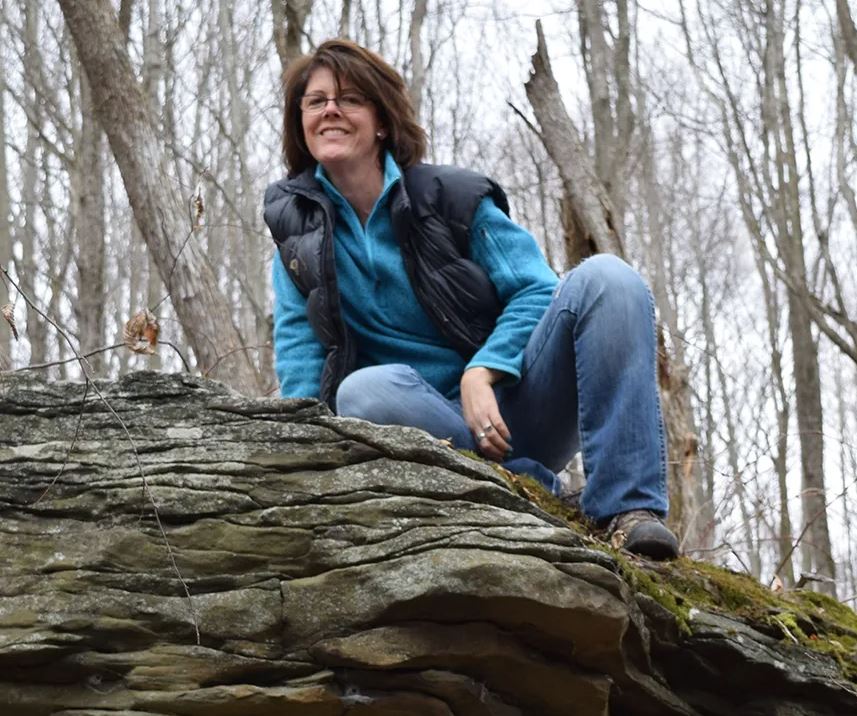Episodes 78 - 81: Telling Effective Climate Change Solution Stories, Unleashing Our Imaginations for Climate Solutions , Women in Wild Places
Episode 81: Women in Wild Places
In this month’s episode of Citizens’ Climate Radio, we feature two women so compelled by their experiences in the wilderness that they published books about them.
Lilace Melin Guinard, is a poet and non-fiction writer. Citizens’ Climate Radio host Peterson Toscano walks alongside Guinard in northern Pennsylvania’s Hill Creek State Park as the two discuss the unique experiences that women face alone in nature. As a young woman who was fed up with non-communicative boyfriends, Guinard sought out solace in wild spaces and places. Backpacking and solo trips equipped her with autonomy and released her from the fear of the outdoors she was taught while growing up in suburbia in the 1980s.

In her memoir, “When Everything Beyond the Walls Is Wild: Being a Woman Outdoors in America,” Guinard explores the challenges and rewards of exploring wilderness alone. She writes to tell the stories of a regular person empowered by facing the risks of enjoying nature alone. This memoir provides accounts of her experiences alone, often accompanied by her dog, in remote wilderness. She reflects on the ways culture socializes women to find safety indoors while overlooking the dangers women and girls can encounter in their own homes. She emphasizes that these cultural messages shape women as they participate in outdoor recreation. Guinard, who has been a professor of creative writing, women’s studies, and outdoor recreation leadership, draws from her expansive knowledge of literature and encourages previously marginalized members of society to take advantage of the beauty of nature and the great outdoors.
Dig Deeper
- Women Outdoors: a non-profit organization dedicated to building a network for women curious about nature
- Ten outdoor women’s organizations you should know
- The Case for Evidence-Based Outdoor Recreation Interventions for Girls: Helping Girls “Find Their Voice” in the Outdoors (pdf) Empirical evidence of the benefits of outdoor recreation on adolescent girls
Art House
“I’m rooting for us, but I’m also rooting for the rest of nature” — Hila Ratzabi
In this Art House segment, Citizens’ Climate Radio shines the spotlight on poet, writer, and editor Hila Ratzabi. In her recent book, “There Are Still Woods,” Ratzabi writes both for herself as well as others who need to process their strong emotions around climate change. Her advice? Recognize that there are ways to get involved. Beyond political action, she recognizes the importance of cultivating our creative sides.

Raised in the borough of Queens in New York City, Ratzabi has always written poetry to make sense of the world around her. Communion with nature has been a personal aspiration of hers since she was a young girl, and it has been a running motif in her body of work. However, it took living through Hurricane Sandy to shift her focus to the relationship between humans and climate change.
In this episode, she reads and breaks down a selection from her book. In “Willapa Bay,” Ratzabi recollects her time at an artist residency in the westernmost point of Washington State, a space where she was able to have a spiritual connection with nature. With her senses heightened, she pondered the sight of the tilted moon and the sounds of the wind blowing through the seagrass. Ratzabi practices gratitude for being a part of nature while simultaneously fretting over grasping Mothers Earth’s fleeting beauty as it slips away due to ongoing and impending threats of climate change.
Listen Now!
Resilience Corner
Tamara Staton, CCL’s Education and Resilience Coordinator, shares the fifth and final step to building resilience: Repeat
Get more tips and resources by visiting The Resiliency Hub.
Tamara encourages listeners to remember that “You are strong, you are resilient, and you can make things happen.”
Transcript
Click here to view a full transcript of this episode.
Episode 80: Unleashing Our Imaginations for Climate Solutions
“Imagination is everything. It is the preview of life’s coming attractions.” – Albert Einstein
As climate advocates, we need to articulate what it is that we are fighting for. What is the world we want to create? Engaging our imagination is essential to stir up the kind of hope and excitement that inspires others to action.
In this episode of Citizens’ Climate Radio, three guests join us to help unleash our imagination potential:
- Hannah Pickard from the National Network of Ocean and Climate Change Interpretation
- Dr. Natasha DeJarnett, a leader in environmental health research and board member of Citizens’ Climate Education and Physicians for Social Responsibility, and
- Sean Dague, a software engineer, a CCL group leader, and an En-ROADS Climate Simulation tool ambassador.
These three guests conduct a thought experiment: Can you imagine a world without fossil fuels? What will it look, smell, sound, and feel like?
You will also hear three new voices who have joined the Citizens Climate Radio team. Ruth Abraham, Lila Powell, and Zach Torpie are each recent college graduates. They share their reactions and responses to what Sean and Hannah have to say about engaging our imaginations in our climate change work.
You can imagine this, too! Share your answers with host Peterson Toscano. Leave a voicemail at 518.595.9414. (+1 if calling from outside the USA.) You can email your answers to radio @ citizensclimate.org
Dig Deeper
- Video of Sean Dague’s Thought Exercise: Imagine a World without Fossil Fuels
- Hannah Pickard CCL International Call March 2020
- Peterson Toscano’s Citizens’ Climate Virtual Conference Breakout Session: Telling a New Kind of Climate Story
- Citizens’ Climate Radio Ep 39 Envisioning and Communicating Climate Success
- Climate Change and the Imagination by Kathryn Yusoff and Jennifer Garbrys (PDF)
Listen Now!
Citizens Climate Radio — A Climate Change Podcast · Unleashing Our Imaginations for Climate Change SolutionsResilience Corner
Once we are able to notice, accept and get help where we need it, we are more able to take action in ways that support our well-being. This brings us to our focus today on the next step: practice.
Tamara Staton is the Education and Resilience Coordinator for Citizens’ Climate Education, and in this installment of the Resilience Corner, she helps us to ask for the help we need.
Get more tips and resources by visiting The Resiliency Hub.
Transcript
Click here to view a full transcript of this episode.
Episode 79: How to tell a climate change solution story
In this episode, host Peterson Toscano looks at climate stories that reveal the impacts of climate solutions. This is a harder story to tell because many of the best solutions are still on the table. In fact, CCLers are working hard to get lawmakers and community leaders to take these solutions seriously and put them into practice. In 25 or 50 years, we will be able to tell many stories about the beneficial impacts these solutions will have. But we need to tell these stories today.
There are three different types of climate solution impact stories you can tell.
- The current solution success story
- The future solution success story
- The solution motivation story
For examples of current climate change solution success stories, we hear from Dr. Anthony Leiserowitz and Yale Climate Connections.
- A new solar-powered car designed to travel up to 40 miles on sunshine alone — that’s enough to cover many people’s daily commutes.
- Eight states and 30 cities team up to reduce flooding threats along the Mississippi. They’ve partnered with Ducks Unlimited to restore more than 60 wetlands that will hold floodwaters during storms.
To hear and read more of these stories visit Yale Climate Connections.
The future climate change solution success story
This type of story relies on our efforts to envision and imagine the world filled with the solutions we advocate for. We want to paint a picture of a future worth pursuing. When we succeed, we create a yearning in others for this better world. For examples of these, head over to the Clifi Imaginarium. Allison Whitaker tells us about the ways they take seemingly dry information about solutions, and turn them into compelling stories. Check out With Many Roots to read these cli-fi solution stories and to learn about the free monthly Introduction to climate fiction on-line workshops.
The climate change solution motivation story
This story reveals why an individual is motivated to do the climate work they do. The story itself may not seem to have anything to do with climate change. Still, this story goes right to the heart of a person’s work.
Citizens’ Climate Radio host, Peterson Toscano, shares one of his motivation stories, and shows us how to then pivot to climate change solutions and specific, meaningful action.
What you will learn in this episode
We can tell effective climate stories. There are two types of climate change stories.
- The climate change impact story
- A story that reveals the dangers climate-changed-induced extreme weather and other impacts have on our lives and the world.
- The second is the climate solution stories. In this episode, three different climate solutions stories are covered.
- The current climate change solution success story: This might be a story about a breakthrough in technology, a new important person or group who is on board in pursuing climate change solutions, or it can be about a solution that has been put into action.
- The future climate change success story: This one requires your imagination to envision what the future will look like with solutions in place. This is a form of cli-fi, or climate fiction.
- And finally the climate change solution motivation story. This story reveals why you are so passionate about a particular climate change solution.
Once you tell a compelling story about your motivation, the future, or climate impact, you can then do the climate change pivot. Connect your story to the solution you are pursuing.
But don’t leave them with just a pivot. Provide your listener with a specific, meaningful, and achievable next step. It might be as simple as asking, “Do you want to get together over coffee sometime next week to talk more about this?”
Do you want to learn more about climate storytelling and get some experience in a group?
Join Peterson for a free on-line storytelling workshop January 17th 2023 8:00 PM Eastern. He will share activities and insights, and he will give feedback to participants about their stories. You will walk away with fresh inspiration in telling your compelling climate stories. It will be fun and informative. Click here to register for the training.
The Art House
Alan Gratz has written nearly 20 books for young adults, including “PRISONER B-3087,” about World War Two holocaust survivor and “Refugee,” which weaves together stories of three children from three countries escaping their countries in search of a new home. In his latest book, “Two Degrees,” Alan takes on climate change.

Author Alan Gratz
He tells us about the challenges he had to overcome in writing about climate change, and how this book was much harder to write than his previous ones. He also gives us a reading from the book.
13-year-old Juno gives a review of “Two Degrees.”

Alan Gratz’s book, “Two Degrees”
Listen Now!
Resilience Corner
Tamara Staton is the Education and Resilience Coordinator for Citizens’ Climate Education, and in this installment of the Resilience Corner, she helps us to ask for the help we need.
Get more tips and resources by visiting The Resiliency Hub.
Tamara Staton, CCL’s Education and Resilience Coordinator
Transcript
Click here to view a full transcript of this episode.
Episode 78: What is an Effective Climate Change Story?
In this episode of Citizens’ Climate Radio, host Peterson Toscano considers stories that focus on the impacts of climate change. These include incidents of extreme weather and stories of changes you have witnessed over time and the ways these changes affect you and everything and everyone you love. This episode will give viewers the opportunity to tell effective climate stories.
Plus, you will hear one climate solution story from the future. Most importantly, you will hear an example of “the climate story pivot.” The pivot happens when you jump off of your story into the climate solution you are proposing.
An extreme weather story by Dr. Natasha DeJarnett
Dr. DeJarnett is an assistant professor at the Christina Lee Brown Environment Institute at the University of Louisville Division of Environmental Medicine. She researches the health impacts of extreme heat exposure and environmental health disparities. If you have ever heard one of Dr. DeJarnett’s presentations, you know she is excellent at sharing data and highlighting the many ways we can protect our loved ones and communities. She is also a powerful storyteller. For this episode, she tells us a dramatic story about the impact of extreme weather in her own life when she was 12 years old.
The most common climate change story is the climate change impact story, which reveals the dangers of climate change-induced extreme weather and other impacts on our lives and the world. It’s important to make your story compelling with specific details and emotions. Once you tell your story, pivot to the climate solution. This is when you connect your story to the climate work you are doing or a particular solution you are pursuing.
Finally, give your audience something to do — suggest a meaningful and achievable next step.
Next month we will do a deep dive into another type of climate change story — a story that reveals the impacts of climate change solutions.

Lilace Mellin Guinard
Poems about parenting and climate change by Lilace Mellin Guinard
As a parent, Lilace Mellin Guinard weaves in emotions that may be familiar to some listeners. Lilace led a poetry workshop for climate change leaders at The BTS Center in Portland, Maine. She recorded readings of her poetry, and Citizens’ Climate Radio host Peterson Toscano adds music and sound effects here. In this episode, you will hear Lilace read two poems, “After the Magi Depart” and “Evergreen.” For people in North America who enjoy winter weather and feel a pang of sadness about the warming of winter, Lilace expresses both grief and determination. Each poem is a mini-story of moments in the life of a parent and children. More importantly, Lilace tells the deeper emotional stories many of us quietly experience.
A story from the future by Allison Whitaker
Also in this episode, Peterson collaborates with Allison Whitaker, one of the facilitators of the Intro to Climate Fiction Workshop offered by With Many Roots. She wrote a story immersed in finding a solution. Together they created a radio drama version of her story, “Forest at the End of the Lane.” This story is inspired by a climate solution known as tree intercropping. According to Project Drawdown, tree intercropping is “a suite of agroforestry systems that deliberately grow trees together with annual crops in a given area at the same time. This solution replaces conventional annual crop production on degraded cropland.” Special thanks to The Wildlife Conservation Research Unit for the awesome badger sounds heard here. You can read more future solution stories like Allisons’ over at the Cli-Fi Imaginarium.
Want to learn more about climate storytelling and get some group experience?
Join Peterson for a free online storytelling workshop on Jan. 17, 2023 at 8:00 p.m. ET. He will share activities and insights, and give feedback to participants about their stories. You will walk away with fresh inspiration in telling your compelling climate stories. Click here to register for the training.
Listen Now!
Resilience Corner
Tamara Staton is the Education and Resilience Coordinator for Citizens Climate Education. In this installment of the Resilience Corner, she has us accepting what we need.
There are two aspects of acceptance that can help us deepen our resilience.
- The first one involves making space and allowing room for our thoughts, feelings, and needs. When it comes right down to it, what you need is what you need.
- The second part of acceptance involves a willingness to see our surroundings and circumstances exactly as they are in the moment. Acceptance in this way, free from judgment, allows us to focus our energy and attention on what matters most
Next month Tamara will take a closer look at asking for help. Get more tips and resources by visiting The Resiliency Hub.
Good News Report
Our good news story comes from Brad Johnson and John Price Kepner from Hill Heat. In addition to voting on candidates during the U.S. midterm elections, voters also weighed in on climate change-related ballot measures. This meant that there were many election success nationwide. Learn more at Hill Heat.
If you have Good News to share, email radio @ citizensclimate.org
We always welcome your thoughts, questions, suggestions, and recommendations for the show. Leave a message on our listener voicemail line: (619) 512-9646. +1 if calling from outside of the U.S.
Transcript
Click here to view a full transcript of this episode.
NEW! Listener Survey
We want to hear your feedback about this episode. After you listen, feel free to fill in this short survey. Your feedback will help us as we make new decisions about the content, guests, and style of the show. You can fill it out anonymously and answer whichever questions you like.
You can hear Citizens’ Climate Radio on:
Also, feel free to connect with other listeners, suggest program ideas, and respond to programs in the Citizens’ Climate Radio Facebook group or on Twitter at @CitizensCRadio.
Recent Posts
